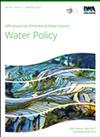Impacts of cacao agroforestry systems on climate change, soil conservation, and water resources: a review
IF 1.8
4区 环境科学与生态学
Q4 WATER RESOURCES
引用次数: 0
Abstract
Agroforestry is crucial for improving water quality deteriorated by anthropogenic activities due to the use of chemical substances, including nitrogen (N) and phosphorous (P) in modern agricultural practices (MAPs). This state-of-the-art review aims to revise the influence of agroforestry systems (AFS) on climate change, soil conservation, and groundwater quality. The novelty of this review is that AFS can improve water quality, reduce nutrient loss, and support the biological, chemical, and physical properties of the soil. It is worth noting that the surficial geologic controls, slope gradient, soil types, and topographical conditions are factors that alter a watershed dominated by agroforestry areas. In addition, anthropic aspects, including agricultural practices, can also cause loss of water quality in basins dominated by an AFS area. This review is also novel in that it outlines how AFS can be used for the phytoremediation of contaminated soils to reduce aluminum (Al), mercury (Hg), and cadmium (Cd), among others. Therefore, AFS can be used for water decontamination, climate change mitigation, climate adaptation, and soil conservation. Further research is required to investigate the contribution of AFS to soil integrity.可可农林复合系统对气候变化、土壤保持和水资源的影响综述
农林复合经营对于改善因现代农业实践中使用包括氮和磷在内的化学物质而导致的人为活动而恶化的水质至关重要。这篇最新综述旨在修正农林系统(AFS)对气候变化、土壤保持和地下水质量的影响。这篇综述的新颖之处在于,AFS可以改善水质,减少养分损失,并支持土壤的生物、化学和物理特性。值得注意的是,地表地质控制、坡度、土壤类型和地形条件是改变以农林区为主的流域的因素。此外,包括农业实践在内的人为因素也可能导致AFS地区主导的流域水质损失。这篇综述也很新颖,因为它概述了AFS如何用于污染土壤的植物修复,以减少铝(Al)、汞(Hg)和镉(Cd)等。因此,AFS可用于水净化、减缓气候变化、适应气候和土壤保护。需要进一步研究AFS对土壤完整性的贡献。
本文章由计算机程序翻译,如有差异,请以英文原文为准。
求助全文
约1分钟内获得全文
求助全文
来源期刊

Water Policy
环境科学-水资源
CiteScore
3.10
自引率
12.50%
发文量
81
审稿时长
6-12 weeks
期刊介绍:
Water Policy will publish reviews, research papers and progress reports in, among others, the following areas: financial, diplomatic, organizational, legal, administrative and research; organized by country, region or river basin. Water Policy also publishes reviews of books and grey literature.
 求助内容:
求助内容: 应助结果提醒方式:
应助结果提醒方式:


